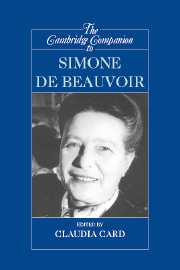Book contents
- Frontmatter
- Introduction: Beauvoir and the ambiguity of “ambiguity” in ethics
- 1 Beauvoir’s place in philosophical thought
- 2 Reading Simone de Beauvoir with Martin Heidegger
- 3 The body as instrument and as expression
- 4 Beauvoir and Merleau-Ponty on ambiguity
- 5 Bergson’s influence on Beauvoir’s philosophical methodology
- 6 Philosophy in Beauvoir’s fiction
- 7 Complicity and slavery in The Second Sex
- 8 Beauvoir on Sade: making sexuality into an ethic
- 9 Beauvoir and feminism: interview and reflections
- 10 Life-story in Beauvoir’s memoirs
- 11 Beauvoir on the ambiguity of evil
- 12 Simone de Beauvoir: (Re)counting the sexual difference
- 13 Beauvoir and biology: a second look
- 14 Beauvoir’s Old Age
- Bibliography
- Index
6 - Philosophy in Beauvoir’s fiction
Published online by Cambridge University Press: 28 May 2006
- Frontmatter
- Introduction: Beauvoir and the ambiguity of “ambiguity” in ethics
- 1 Beauvoir’s place in philosophical thought
- 2 Reading Simone de Beauvoir with Martin Heidegger
- 3 The body as instrument and as expression
- 4 Beauvoir and Merleau-Ponty on ambiguity
- 5 Bergson’s influence on Beauvoir’s philosophical methodology
- 6 Philosophy in Beauvoir’s fiction
- 7 Complicity and slavery in The Second Sex
- 8 Beauvoir on Sade: making sexuality into an ethic
- 9 Beauvoir and feminism: interview and reflections
- 10 Life-story in Beauvoir’s memoirs
- 11 Beauvoir on the ambiguity of evil
- 12 Simone de Beauvoir: (Re)counting the sexual difference
- 13 Beauvoir and biology: a second look
- 14 Beauvoir’s Old Age
- Bibliography
- Index
Summary
A critic of the currently popular genre “Reality TV” sums up the enterprise: the basic idea is that the watchers and the watched will more or less forget about the cameras, “and the result will be raw, emotion-packed - and tedious.” Having pointed out that the extensive editing of such programs to adapt them to the respective tastes of Europe and America means that viewers are surely not in fact getting an unadorned slice of reality, this critic hypothesizes that “reality TV” is in principle an oxymoron. The general hypothesis may be wrong; Road Rules and Real World seem to show that normal teenagers discussing their feelings can forget all about the cameras and behave naturally. Still, the very availability of the kind of information supplied by “Reality TV” raises an important question, one which was anticipated by Simone de Beauvoir in her 1965 contribution to the forum, Que peut la littérature? She describes reading Children of Sánchez, an account put together from tapes that recorded the daily conversations of a father and his four children off and on over an eight-year period. The advantage of this format of collecting and presenting information, she observes, is that the reader receives a presentation of family life from multiple viewpoints, the sort of thing that literary works frequently try to do. One could, she says, produce more works of this kind – technologically we could record and present information about the daily inner workings of all sorts of social units. If we did so, she asks, “Would literature still have a role to play?” Beauvoir's answer is “Yes” (QPL 74-75). The difference between information and literature, she says, has to do with the basic features of the human condition and with the distinctive way in which literature functions.
- Type
- Chapter
- Information
- The Cambridge Companion to Simone de Beauvoir , pp. 129 - 148Publisher: Cambridge University PressPrint publication year: 2003
- 2
- Cited by

